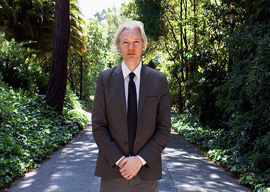
January 12, 2011

We must hang together, gentlemen…else, we shall most assuredly hang separately.
“Benjamin Franklin
When a journalist disappears in Russia or is murdered in Iraqi Kurdistan, his or her colleagues in safer climes stand up to be counted. No one should be killed, tortured, or imprisoned for publishing information or opinions that the powerful find inconvenient. Organizations such as the Committee to Protect Journalists, Article 19, and PEN regard it as their duty to defend writers” and publishers” rights, as PEN famously did for Arthur Koestler against Nazi tyranny in the 1930s. Index on Censorship, a publication with an honorable pedigree, came into existence to publish the samizdat articles and stories of writers who risked the gulag for expressing themselves.
In journalism schools, they teach aspiring reporters it is their duty to ferret out information the state and other power centers conceal that affects ordinary people’s lives. Bringing information to the governed about their governors is the breath of democracy, the exposure that animates liberty’s spirit, and a necessary check against the world’s imbalances in wealth and power. When Upton Sinclair revealed the way meat was packaged in America in The Jungle, when Lincoln Steffens told the truth about municipal government corruption, when Ida Tarbell exposed the Standard Oil Company to public scrutiny, when I. F. Stone published the truth behind the Gulf of Tonkin lies that Lyndon Johnson used as an excuse to escalate the war against Vietnam (the Weapons of Mass Destruction of its time), when Seymour Hersh reported the American massacre at My Lai, when Ray Coffey of the Chicago Daily News broke the story of America’s illegal bombing of Laos, did their colleagues rise as one to defend them?
The hell they did. A few stood with the investigators, but most condemned them. Hearst columnists and other guardians of the public’s right to ignorance railed against the muckrakers for betraying American values. Who could be against Rockefeller and Standard Oil apart from a traitor? The good burghers of the popular press turned on them like a pack of hounds for questioning the wisdom of duly (albeit corruptly) elected rulers and daring to publish documents that God had deigned as comprehensible only to a bureaucratic inner circle.
Journalistic guard dogs of power, the most likely hacks to climb the ladder for the Purina Dog Chow of corporate-media op-ed columns, talk shows, and editorships, have turned against WikiLeaks. Julian Assange has committed the crime for which we, from the safety of time’s passage, honor Steffens, Tarbell, Stone, and Hersh. It is no surprise that a pseudo-journalist such as Bill Kristol at The Weekly Standard calls for Washington to employ “various assets to harass, snatch or neutralize Julian Assange and his collaborators.” But it is more difficult to excuse the distance that real journalists, many of whom published the documents and videos that WikiLeaks made available to them, are putting between themselves and Assange. The Society of Professional Journalists, the National Association of Broadcasters, and The New York Times“ opinion pages have run for cover as fast as politicians during a police raid on a whorehouse.
The New York Times, along with The Washington Post, had the honorable distinction of publishing the Pentagon Papers. They received those documents from Daniel Ellsberg, who was pilloried in his time just as Assange is today. The Nixon Administration, in a precursor to the Watergate break-in, raided his psychiatrist’s office and circulated stories that Ellsberg was insane. The argument was not unknown in the Soviet Union: If you are against us, you must be crazy. Now they are turning on Assange over his sex life, his alleged imperiousness, and his supposed recklessness.